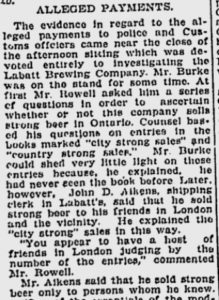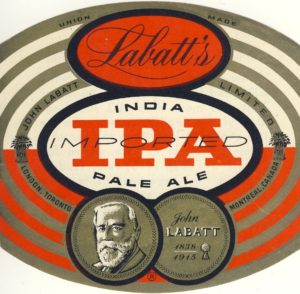Jordan has posted an excellent article this evening on the current state of the sale of beer in Canada’s biggest province, Ontario. Thirteen and half million Ontarians are served their beer through two large entities: (i) The Beer Store which is owned by the big brewers and (ii) the Liquor Control Board of Ontario, a provincial Crown corporation. Sure, you can buy your beer at a microbrewery, you can home brew and you can even still go to a brew-your-own place. But you really buy beer from the big two outlets. Brew-your-own or “U-brew” businesses are good to keep in mind as we think of how to move forward. In our book Ontario Beer, we pointed out that in the mid-1990s, “brew your own beer” businesses held a position comparable to small breweries today until they caught the attention of big beer. At a 1996 Federal hearing on taxation of major Canadian industries, Sandy Morrison, President of the Brewers Association of Canada complained about the lack of any imposition of taxation or regulation on these businesses:
These brew-on-premises outlets now have an 8% share of the British Columbia market and a 3% share in Ontario, which is the largest beer market in Canada. In total, they account for about 10 million dozen-cases of beer a year. The production from these unlicensed, unregulated mini-breweries exceeds that of the micro-breweries across Canada, and certainly in the two provinces concerned.
Brew-on-premises business were full-scale commercial operations that focused on government alcohol tax avoidance. Lost tax revenues in Ontario and BC totaled $69 million according to Morrison. Soon thereafter the law was changed. Regulations as well as taxes were applied. As can be expected, market share collapsed. The interests of the government and big brewing aligned to pressure the young upstarts.
There are echoes of more than the mid-90s in the situation today. The immediate origins of both the LCBO and The Beer Store date to the mid-1920s. After a series of elections and referendums, in 1927 Ontario’s experiment with prohibition ended with the repeal of the Ontario Temperance Act and its replacement with the Liquor Control Act. Along with the new law, the Liquor Control Board was founded. The province was once again drinking full strength booze in their homes – albeit after purchasing their drink at a government controlled store and transporting it in a sealed package. In the same year, Brewers Warehousing Co. Ltd. was founded as a brewers’ distribution collective. The provincial government retained control of the sale of wine and spirits through the LCBO, but beer was retailed by hundreds of mom-and-pop stores. Initially, the brewers were involved only in wholesale operations, jointly warehousing and distributing their product to stores operated by private contractors. In 1940, the brewers bought out the retailers and took over the stores, changing their name to Brewers Retail Inc and, more recently, changing again to The Beer Store.
Another thing was happening at the end of the 1920s. A corporate giant was starting out his career. Starting with next to nothing other than a few years in the financing business, E.P. Taylor had a plan to acquire and merge a large number of regional and local brewers with the goal of controlling half the brewing capacity in the province. Virtually all Ontario’s firms but Labatt and the breweries controlled by the Doran family in the north were his targets. His goals made perfect sense for the times. Breweries were operating at under 25% capacity. They were technological dinosaurs. By 1931, Taylor already controlled 27.5% of all Ontario beer sales. By 1950, he controlled 50% of the provincial beer market compared to 20% for Labatt. His deal making reached beyond Ontario. He shared a correspondence with H. William Molson, president of Quebec’s most famous brewery which dated back to 1932 and, in 1942, Taylor suggested quite an arrangement:
Don’t you think for the duration of the war we should arrange to divide the business in the two provinces in a fixed proportion and cut out most of the waste? I fully realize that your Company is not as extravagant in Ontario as some of the rest of us and you are certainly in an enviable position in that regard. At the same time I think that if you gave leadership to a proposal for pooling the business until after the war, everyone would feel inclined to work something out.
“Waste” was a theme for E.P.Taylor. In September 1939, he spoke to a meeting of the Brewers Warehousing Company. As war had just been declared, the tone was certainly patriotic but it was also entrepreneurial. Taylor argued that the lowest price possible for beer should be established to decrease “wasteful selling expenses” while increasing sales, volume and taxes for the war effort. Profits would also rise. While not the start of the concept of commodity beer and radically controlled distribution, this statement certainly places it at the centre of Ontario’s way forward. When you think of The Beer Store today you need to hear E.P. Taylor’s words from 1939 – “wasteful selling expenses” – ring in your ears. As Jordan put it today:
The Beer Store’s organization is such that it works in your favour if you are a very large company. The fact that your beer can only be sold in predetermined locations and that the organization that runs those locations stocks those stores from centralized warehouses means that you don’t have to pay for delivery, storage or a sales force. It’s a gigantic savings. The large breweries don’t generate profit from owning and running The Beer Store and this is something critics frequently fail to understand. The monopoly is not profitable for the owners because it extracts profit on sales. It is profitable for the owners because it saves a frankly ridiculous amount of money on outlay.
By the late 1950s, E.P. Taylor was arguably the most famous Canadian before Pierre Trudeau came on the scene a few years later. His positive effect on the economy of Ontario and Canada cannot be underestimated. But he stepped away from his role as corporate leader before 1970. In another ten years, loyalty to ale and even Ontario’s beer brands was fading fast. We now live in a marketplace where the best selling beer is Coors Light and The Beer Store is owned by foreign brewing corporations. That all being the case, why retain a distribution model set up in the late 1920s to balance the needs of local brewers with the majority of the population which still had strong preference for temperance principles? None really. None at all. Unless, like in the mid-1990s, the interests of big beer and government revenue are all that matter.

 At Item H.1 of Table X of section B.16.100 of the
At Item H.1 of Table X of section B.16.100 of the 
 This in interesting… well, to me at least. It is from the
This in interesting… well, to me at least. It is from the 